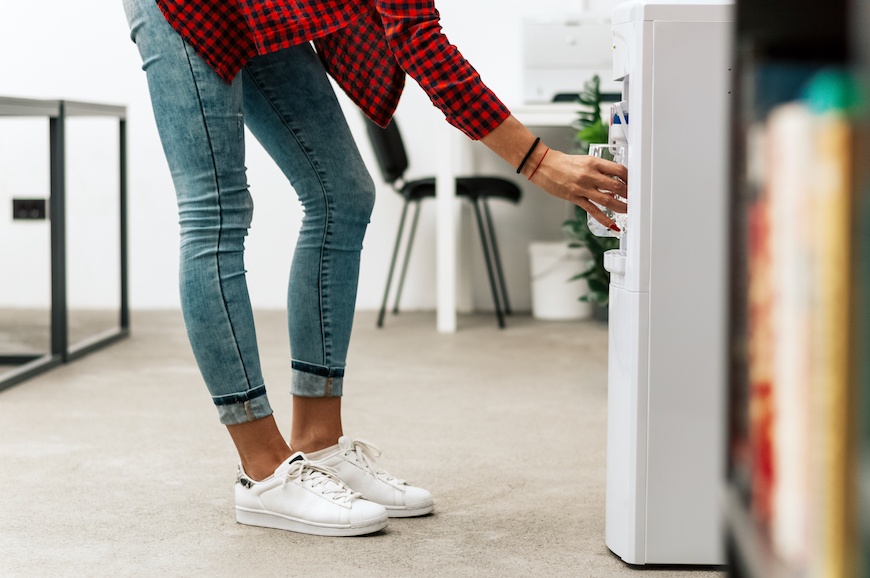File Under “Phew!”: Experts Say There’s No BPA in Bottled Water
This hotly debated topic has been around for, like, ever. Some experts argue that it’s detrimental to our health due to things like Bisphenol A, or BPA, a hazardous environmental toxin and endocrine disruptor that's been shown to cause cancer. While others, like Peter Gleick, a scientist and expert on global water and climates issues, say bottled water is perfectly safe to drink. “There’s nothing wrong with bottled water from a health perspective,” he says. Elizabeth Royte, author of Bottlemania: How Water Went On Sale and Why We Bought It agrees, saying that, “There's no evidence it's bad for us.”
One major reason why? That belief that plastic water bottles contain BPA is a myth. According to Gleick, polyethylene terephthalate (PET), which is the type of plastic most water bottles are made of, doesn’t contain BPA and never has. “PET is actually a remarkably good plastic,” he says. “It’s one of the reasons we put beverages in it. As far as we know, bad things do not leak out of PET.” So, he says, BPA isn’t something you need to worry about when you’re hydrating from a plastic bottle.
So there you have it: Bottled water is safe to drink. However, that doesn’t mean it doesn’t come along with a host of other issues that will make you want to switch to eco-friendly water bottles and filtered water, stat. “From an economic perspective and an environmental perspective, bottled water has some serious liabilities,” Gleick says.

{{post.sponsorText}}
Below, the the two water pros share 4 things you need to know about bottled water, including where it comes from and how it’s affecting our precious Earth.

1. Water bottles are one of the biggest source of plastic waste
“The bottled water industry will argue that the plastics in bottled water are 100-percent recyclable,” Gleick says. “In theory, that's correct, but that’s different than recycled. Most plastic never actually gets recycled.”
So even though yes, technically, plastic water bottles are recyclable, of the billions and billions of plastic bottles that are produced in the United States every year only about 30 percent are getting recycled, Gleick says. Royte adds, “The vast majority of plastic bottles end up in landfills, incinerated, or littered across the landscape and along or in waterways.”
2. It takes a tremendous amount of energy to produce bottled water
Water bottles don’t just magically appear on the shelves of your nearest Whole Foods. An incredible about of energy (and money) is required to create and then get those H2O bottles to you. “It takes energy, mostly from fossil fuels, to pump water from springs or municipal wells, treat it, make the plastic bottles, fill the bottles, and transport them around the world,” Royte says. “The environmental footprint of bottled water is massively higher than the environmental footprint of tap water. And drinking bottled water is up to 2,000 times more expensive than drinking the same quantity of tap water.
3. Tap water is safe to drink too
If you’re ready to say sayonara to bottled water bottled forever, drinking tap water is actually a good alternative. “We have an incredibly great tap water system in the United States,” Gleick says. “It provides remarkably high quality, reliable, cheap water to us.” Although every municipal water system is different, both tap and bottled water have to meet the same federal drinking standards defined in the Safe Drinking Water Act, Gleick says.
According to Royte, tap water is actually better regulated than bottled water. “Tap water providers are required to reveal the results of their tests to consumers,” she says. “Bottled water companies, though held largely to the same standard as tap water, aren't required to reveal the results of their testing.”
That said, there are many ares in the United States that don’t have access to safe tap water, Gleick says. So it’s important to do your own research and ensure that what you’re drinking is safe. The quality of the tap you get at home could also have to do with your plumbing. “A city could deliver perfectly safe and tasty water to your house, but if your water tank is corroded, your PCV pipes are crumbling, or you have lead or copper fixtures, your water may not be healthy to drink,” Rotye says.
4. Bottled water actually comes from tap water
Ironically, Gleick says, a lot of bottled water that’s produced in the US (about half) is actually tap water. The water bottle companies (think Aquafina and Dasani) might then reprocess it or filter it before they bottle it up, but it actually originates as tap water and is drinkable when they get it. The other half of the water that’s sold in bottles is usually spring water, Gleick says. That means it was derived from a natural source such as a groundwater aquifer, a well, or a spring and it also has to meet federal standards. Nestle dominates the spring water category, he adds, with brands like Arrowhead on the west coast and Poland Spring Water on the east coast.
One place you will find BPA? Your receipts. And once you stock up on your reusable bottles, try this handy hack for storing them.
Loading More Posts...